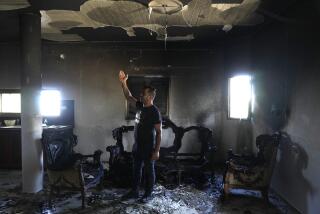W. Bank Jewish Settlers Warn Against Israeli Concessions
ELON MOREH, Israeli-Occupied West Bank — Yaacov Cohen says he hopes Benjamin Netanyahu will stand firm, negotiating for peace but yielding not another inch of the land the Jewish settler calls Judea and Samaria.
With plans announced Sunday for an urgent Israeli-Palestinian summit this week in Washington, Cohen and others in this hilltop settlement said the Israeli prime minister must resist making major political concessions to the Palestinians in his bid to end the current crisis, which has been marked by violent clashes between Israelis and Palestinians.
Most important, they say, Netanyahu must ensure that Yasser Arafat is not “rewarded” at the bargaining table for the street battles that killed at least 72 people last week and wounded hundreds more in the wake of the Israeli opening of an archeological tunnel near Jewish and Muslim holy sites in Jerusalem.
“Usually, Israel loses in negotiation what it gains in battle,” Cohen, 46, said as he sat inside a palm-thatched hut his family built for the Jewish holiday of Sukkot. “We must not do that again.”
Settlers such as Cohen and his neighbors have been watching recent confrontations in the Palestinian territories with special concern: They are on the front lines of a conflict that seems far from resolved.
Since 1967, when Israel seized the West Bank and Gaza Strip from the Arabs in the Six-Day War, settlers have been a source of friction with the Palestinians, who see in their presence a reflection of Israel’s claims on the area. Under Israeli-Palestinian peace accords, Israeli troops have pulled out of the Gaza Strip, all major cities in the West Bank except Hebron, and hundreds of West Bank villages.
Elon Moreh, a community of about 200 families, is one of 144 Jewish settlements in the West Bank and Gaza, where about 140,000 Jews live among an overwhelmingly Arab population.
The question of the settlers, along with the other most difficult issues dividing the two sides, is scheduled to be discussed in the final phase of negotiations.
But Palestinians express frustrations with delays in the peace talks. As they wait for the discussions to begin, they say, the land is likely to disappear; Netanyahu’s government has given preliminary approval to the construction of several thousand new houses in the territories.
From their tidy, red-roofed community, dotted with patches of lawn and neat gardens, the residents of Elon Moreh heard the gunfire last week in the nearby Palestinian-ruled city of Nablus. They saw the smoke from fires set by Palestinians who stormed the Jewish shrine of Joseph’s Tomb, in a clash that left six Israeli soldiers and two Palestinians dead.
And they heard worrisome news from Gaza: Large groups of Palestinian demonstrators had marched toward several isolated Jewish settlements, threatening to turn the communities into the next battleground. The crowds were broken up and dispersed.
The settlers here said they were saddened but not surprised by any of the incidents. They had always believed it was only a matter of time before the peace process that began with the 1993 Oslo agreement between Israelis and Palestinians would lead to violence. And now, as they had warned, the fighting was being done not with rocks but with guns, in the hands of Palestinian police.
“Now we are seeing exactly what the Oslo agreement is bringing us,” Cohen said. “Now we have to deal with thousands of people--to us, many of them are terrorists--who are armed with guns.”
Nearby, in a house shaded by a large pomegranate tree, Rabbi Menachem Felix said it distressed him to criticize any government of Israel. Nonetheless, he said that Israel’s agreement with the Palestinians was the direct result of the previous Palestinian uprising against Israeli rule, the intifada, which began in 1987.
“The reason for what’s happening now is that they learned a lesson the last few years that when they make this kind of pressure on us, we recoil,” Felix said. “The first thing now is for Netanyahu not to give up. We must give a lesson that when they use violence against us, they can’t gain.”
Felix said, for instance, that Israel should increase, not reduce, its military presence at all flash points in the West Bank and Gaza. The army also should stay indefinitely in Hebron, canceling the overdue troop withdrawal from that city altogether, he said.
Felix said he cannot call the negotiations with the Palestinians a peace process because he has no faith in the outcome. Instead, he calls them the “Oslo process.”
He and other Elon Moreh settlers said they have always opposed the peace negotiations and that last week’s violence only hardened their resolve against them. The Palestinians, they said, have shown that they do not want peace, actually, but an end to the Jewish presence in the West Bank.
And that, they vowed, will never happen.
“We are not in Eretz [Greater] Israel to make peace,” Cohen said. “We are here in order to live. And if there is no choice, we are ready to live here for all eternity without peace.”
More to Read
Sign up for Essential California
The most important California stories and recommendations in your inbox every morning.
You may occasionally receive promotional content from the Los Angeles Times.










